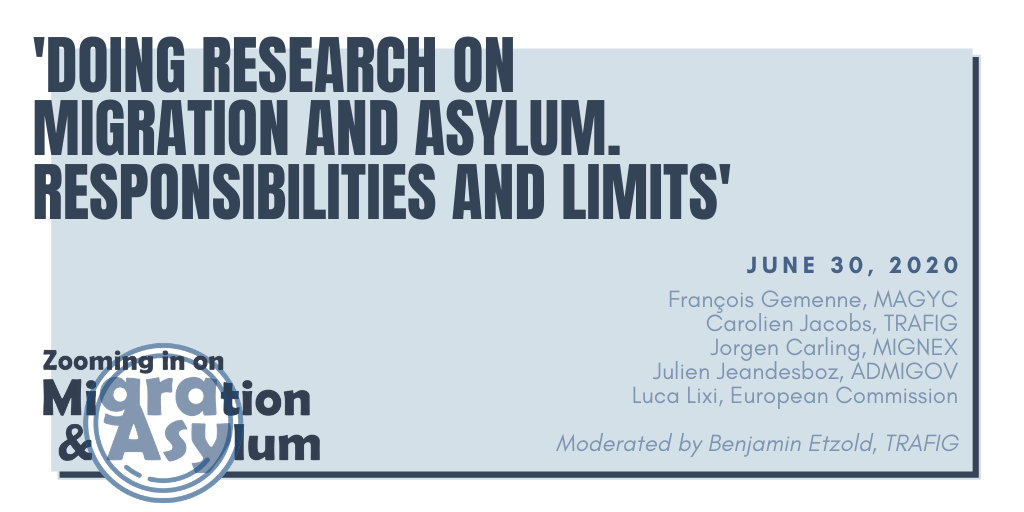#1: Doing research on migration and asylum. Responsibilities and limits

30 June 2020, 13:00 – 14:30 CET
What is the role of academic research in better understanding migration and asylum and informing policymaking in these fields?
Mid-way through each year, UNHCR publishes its latest ‘Global Trends’ report on forced displacement, the European Asylum Support Office (EASO) presents its ‘Annual Report on the Situation of Asylum in the European Union’ and the Internal Displacement Monitoring Center (IDMC) circulates its ‘Global Report on Internal Displacement’. These reports offer the most recent global and regional data on the number of refugees, asylum seekers, internally displaced persons and other populations of concern, including asylum decisions, pending cases, resettlement, etc. The analysis of such data enables the identification of key trends and pressing protection needs and is crucial for humanitarian action and policy-making. These reports are also a powerful tool for advocacy, and thus serve multiple purposes.
Academics make use of these data sets, too, and complement them with findings stemming from own qualitative and quantitative research and policy analysis. Not bound by specific mandates, they may use different framings and concepts that are embedded in academic rather than policy debates and thus come to very different conclusions than reports that are institution-driven and policy-oriented. Many scholars also directly criticize recent policy developments and the institutions involved. Often, however, their findings are not presented in the most accessible formats for a broader audience. As a result, despite the often-shared urge to think out of the box and provide necessary evidence to do so, significant empirical research results often remain unacknowledged by policy and policymakers.
Research projects in the field of migration, displacement and asylum that are funded by the European Commission through the Horizon 2020 programme face this same dilemma. On the one hand, they are seeking to produce new knowledge in these interlinked fields that meets the criteria of academic excellence, highly important for participating institutions and individual researchers. On the other hand, they are also expected to inform and interact with practice and policy and thereby employ multiple formats for stakeholder engagement – and some are more and some less successful in this regard. In our H2020 project’s work, we thus often ask ourselves questions such as the following:
-
What kind of knowledge do we (want to) produce on migration, displacement and asylum?
-
Who are the primary recipients and beneficiaries of our research?
-
What are the benefits of our research for refugees and other migrants?
-
Where are the limits of our (out)reach?
In this webinar – the kick-off for the H2020 webinar series on migration and asylum – we will discuss such questions with colleagues working in H2020 projects and with a representative of the European Commissions’ Directorate-General for Research and Innovation.
Moderation and host: Benjamin Etzold, BICC, TRAFIG’s scientific coordinator Invited speakers:
- François Gemenne, University of Liège on behalf of MAGYC
- Carolien Jacobs, Leiden University on behalf of TRAFIG
- Jorgen Carling, Peace Research Institute Oslo (PRIO) on behalf of MIGNEX
- Julien Jeandesboz, Université Libre de Bruxelles on behalf of ADMIGOV
- Luca Lixi, Migration Policy Officer at the European Commissions’ DG Research and Innovation
Recording of webinar #1:
You can register for the webinar series here. You will receive a confirmation email upon registration.